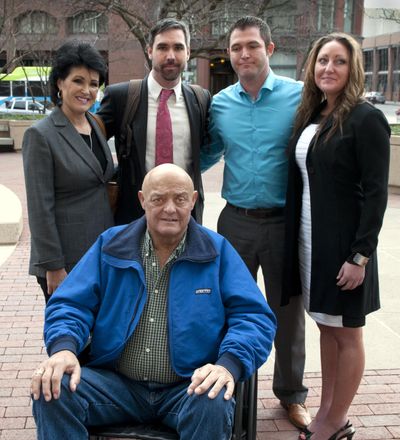‘Kettle Falls Five’ members get prison time in federal marijuana case

The marijuana grow that has now netted jail time for four members of a self-proclaimed medicinal farming family out of Stevens County may have started with good intentions, but ended as a “distribution center,” said the federal judge who handed down their sentences.
“Maybe that was a byproduct of being so successful,” said U.S. District Court Judge Thomas O. Rice, ruling the members of the so-called Kettle Falls Five grew more than 150 pounds of marijuana in the hills of Stevens County between 2011 and 2012.
Rice sentenced Rolland Gregg to 2 years and 9 months in prison. He gave Gregg’s wife, Michelle, and his mother, Rhonda Firestack-Harvey, 1 year and 1 day in federal custody. All will remain out of prison pending an appeal, a notice of which will be filed in the next two weeks, said lead defense attorney Phil Telfeyan.
“I thought Judge Rice would be much more reasonable,” Telfeyan said after the hearing, saying the lengthy prison sentences in a state that subsequently decriminalized marijuana and set up state systems to grow recreational and medicial pot “outrageous.”
Rice found that the members of the family did grow and use marijuana for medicinal purposes. But that did not factor into his sentence.
“This court does not enforce state law,” Rice told a courtroom nearly full of supporters, some wearing green ribbons signifying the medical marijuana industry and others with T-shirts bearing supportive messages. “This court enforces federal law.”
It’s a statement Rice made before sentencing co-conspirator Jason Zucker, who took a plea deal before trial earlier this year and testified against the family, to 16 months in federal prison in July. Larry Harvey, the patriarch of the family, recently died of cancer, his wife said.
“I am very sorry for breaking the law,” Firestack-Harvey told Rice, an apology echoed by all three defendants sentenced Friday in Spokane. “If my husband, Larry Harvery, were with us, I know he would be remorseful as well.”
The case has drawn national media attention and has been cited by activist groups as an example of prosecutorial overreach by the federal government. In comments after sentencing, Telfeyan referred to a federal spending bill passed last year that prohibits federal prosecutors from using public money to try marijuana cases that would be protected by state laws.
Kari Boiter, a a medical marijuana patient and local activist, took in the proceedings Friday. She called the hearing, and the prosecution’s case against the family, “a huge waste of time and money.”
“Clearly Congress has changed the law, but prosecutors are still going after these cases,” Boiter said.
A positive from the sentence could be a wake-up call to national legislators that they need to remove marijuana from a list of controlled substances that are always outlawed. Under federal law, marijuana is classified in the same category as heroin
The Harvey residence, northwest of Kettle Falls, was searched by federal authorities in August 2012, almost fourteen years after Washington state voters approved the decriminalization of medical marijuana and three months before the approval of a recreational marijuana market.
Federal prosecutors had argued at trial that the growers profited from the marijuana farm, while defense attorneys said the weed grown there was used purely for medicinal purposes.
On Thursday, prosecutors introduced a report from Sam Keiser, the Drug Enforcement Agent in charge of the case. That report referred to a conversation in February 2013 between Michelle Gregg and federal authorities, where Gregg said trimmers were paid tens of thousands of dollars to prepare the marijuana after harvest in 2011.
Telfeyan argued the defense had requested the notes from that conversation more than a year ago, to prepare for trial. U.S. Assistant Attorney Earl Hicks said Gregg and her attorney, Bevan Maxey, were present for the conversation and should have disclosed its details to the defense team.
The defense filed a motion to dismiss the case because prosecutors had not provided the report, which the agent prepared earlier this week based on his notes from the interview more than two and a half years ago. Rice denied that motion, saying it didn’t factor into his sentencing considerations.
Telfeyan, a civil rights attorney based in Washington, D.C., said that issue would be brought up in an appeal of the case to the U.S. Ninth Circuit Court of Appeals.
“We’re going to challenge it,” he said.